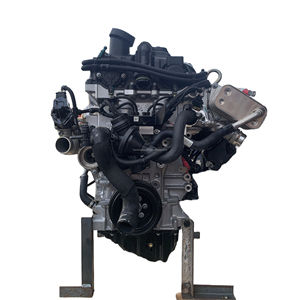Enhancing Your Automobile's Performance with Import Engines
A Thorough Comparison of Different Kinds Of Import Engines and Their Applications in Different Automobiles
From the performance of turbocharged engines to the ecological friendliness of electrical powertrains, the spectrum of import engines available in today's market provides to a broad array of driving preferences and requirements. Whether it's the torque of a diesel engine or the non-traditional design of a rotating engine, comprehending the subtleties of each type and how they straighten with particular lorry demands can considerably affect performance, gas economy, and total driving experience.
Turbocharged Engines
Turbocharged engines, understood for their capacity to improve power result successfully, have actually ended up being significantly common in modern-day car styles. By utilizing exhaust gases to drive a generator that compresses inbound air into the engine, turbochargers successfully enhance the quantity of air and fuel blend that can be combusted, leading to improved efficiency without dramatically enhancing engine dimension. This modern technology enables suppliers to downsize engines, resulting in far better fuel effectiveness while keeping power degrees comparable to larger, normally aspirated engines.

Hybrid Engines
With the developments in engine innovation assisting in improved performance and efficiency, the auto industry has seen an increase in the integration of hybrid engines as a lasting service for power shipment. Hybrid engines integrate the benefits of both internal burning engines and electrical motors to supply enhanced fuel performance and lowered exhausts. By seamlessly switching between both source of power or utilizing them simultaneously, hybrid engines supply convenience in different driving problems.

In addition, hybrid innovation is not limited to a certain car kind, with applications ranging from portable sedans to bigger SUVs and even high-performance cars. As ecological concerns and gas performance guidelines become progressively prominent, hybrid engines represent a substantial step towards sustainable transport services.
Electric Engines
Electric engines have actually revolutionized the vehicle sector with their environmentally-friendly and effective power distribution systems. import engines. These engines operate by converting electric power into power, supplying a smooth and silent driving experience. Unlike conventional burning engines, electric engines create absolutely no tailpipe emissions, decreasing the total carbon impact of automobiles and assisting fight air contamination
Among the vital advantages of electric engines is their high power performance, typically transforming over 80% of the electrical power right into propulsion. This effectiveness equates right into price savings for consumers through minimized gas expenses. Additionally, electric engines need less upkeep contrasted to inner burning engines, as they have less relocating components that can break over time.
Electric engines are frequently utilized in electrical lorries (EVs) and hybrid electric vehicles (HEVs) EVs rely solely on electric engines for propulsion, drawing power from rechargeable batteries. On the other hand, HEVs combine electric engines with standard interior burning engines to enhance fuel efficiency and decrease emissions. The flexibility and sustainability of electric engines make them an encouraging option for the future of transportation.
Diesel Motor
Diesel engines are renowned for their outstanding gas efficiency and robust performance in a range of vehicle applications. These engines run by pressing air in the cylinders, which causes heats that ignite the injected diesel fuel without the requirement for stimulate plugs. This combustion technique supplies diesel engines with higher torque outputs compared to gasoline engines, making them optimal for durable automobiles like vehicles, buses, and building and construction tools.
Among the essential advantages of diesel engines is their exceptional fuel efficiency, as they can travel farther on a gallon of gas contrasted to gas engines. This effectiveness is particularly advantageous for long-haul transportation and commercial fleets, where reducing gas prices is a substantial aspect. Furthermore, diesel engines are recognized for their longevity and long life, needing less maintenance over their life-span compared to gasoline engines.
In recent times, advancements in diesel engine modern technology have actually likewise focused on reducing exhausts to satisfy strict ecological guidelines. Modern diesel engines are equipped with sophisticated emissions control systems, such as diesel particle filters and careful catalytic decrease, which aid decrease contaminants released visit this site right into the ambience - import engines. These advancements have actually made diesel engines cleaner and more eco friendly while retaining their performance and performance characteristics
Rotating Engines
Popular for their one-of-a-kind design and performance features, rotary engines offer an unique choice to traditional combustion engine modern technologies like diesel engines. These engines, also understood as Wankel engines, run on a check these guys out various concept compared to standard piston engines.

Final Thought
To conclude, the contrast of different kinds of import engines highlights the variety of choices available for numerous automobiles. Turbocharged engines visit here provide enhanced power and efficiency, hybrid engines combine standard and electric source of power for boosted fuel economic climate, electric engines provide a tidy and lasting alternative, diesel engines are known for their durability and torque, and rotating engines use an one-of-a-kind design with potential for high performance. Each engine kind has its very own strengths and applications in the auto market.
Additionally, hybrid engines add to a quieter driving experience and frequently give a smoother acceleration contrasted to conventional inner burning engines.
Renowned for their one-of-a-kind design and efficiency characteristics, rotating engines provide a distinct choice to conventional burning engine innovations like diesel engines. These engines, likewise recognized as Wankel engines, operate on a various principle compared to conventional piston engines. In spite of these constraints, rotary engines continue to attract enthusiasts and makers looking for a various engine technology with distinct advantages.
Turbocharged engines use raised power and efficiency, hybrid engines incorporate electric and typical power resources for improved fuel economic climate, electrical engines provide a clean and sustainable option, diesel engines are recognized for their durability and torque, and rotary engines provide a distinct layout with potential for high performance.